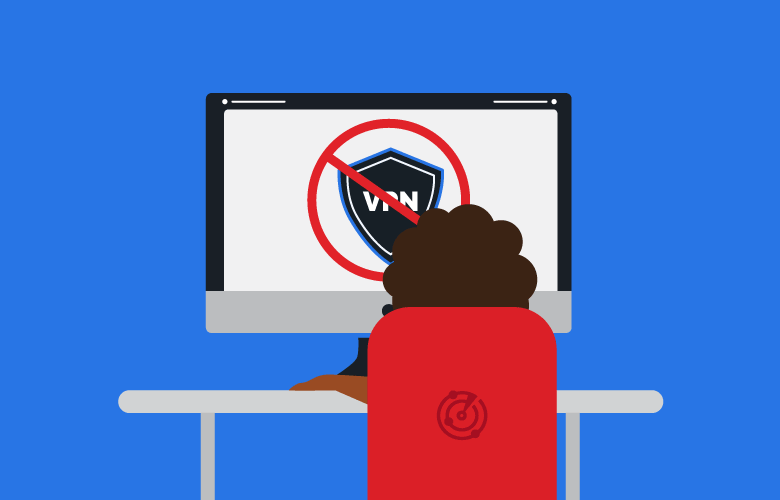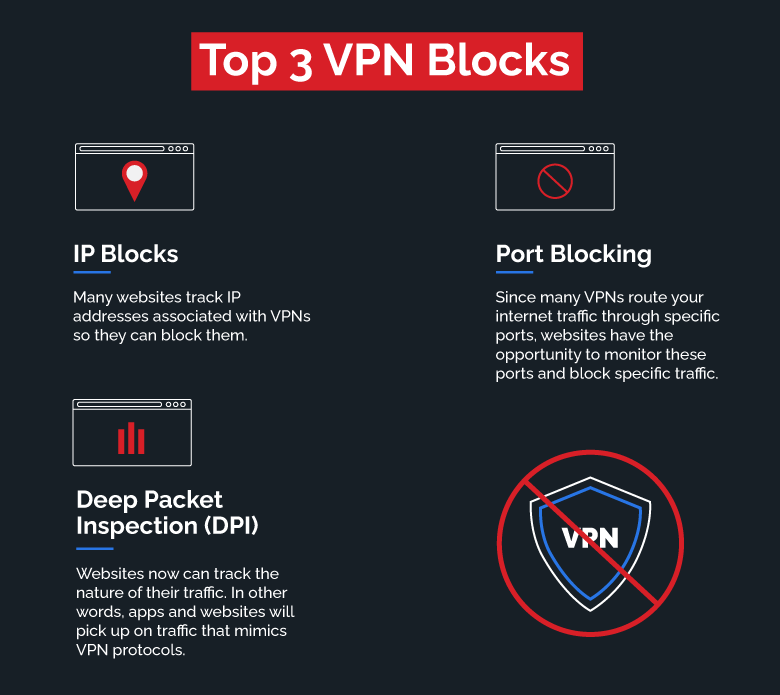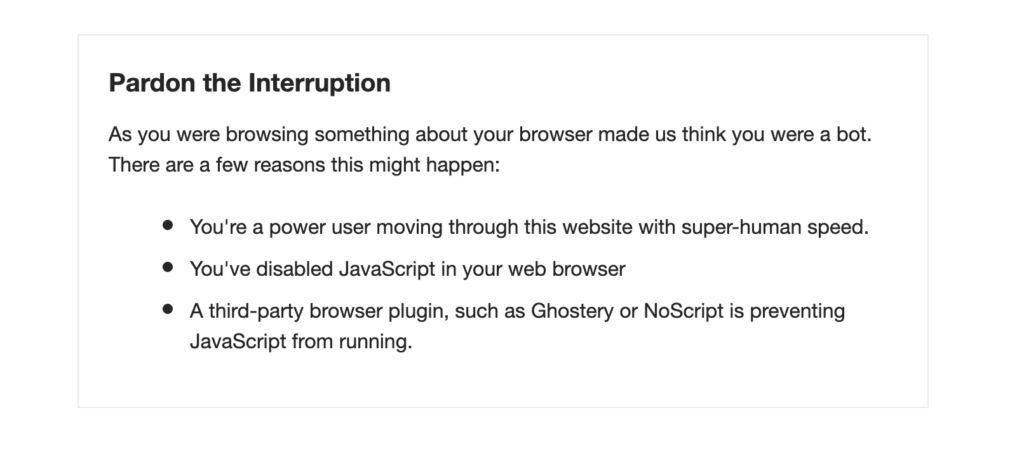October 4, 2021
Best Privacy Tools of June 2025: A Complete Guide
In the words of Edward Snowden in his memoir Permanent Record: “ Saying that you don't care about [...]

WHAT’S IN THIS REVIEW?
Disclaimer: Partnerships & affiliate links help us create better content. Learn how.
It’s no secret that VPNs allow you to bypass censorship restrictions for international content, but did you know that certain domestic apps will glitch when you connect to a VPN? With the importance of identity protection on the rise due to cyber attacks, many apps and websites are cracking down on their security protocols, resulting in unintended consequences like VPN blocks when you hide your IP address.
Some apps, for example, won’t even allow you to log into your account because it doesn’t recognize your regular IP address. Luckily, these issues are benign and easy to fix. Keep reading to learn more about how to use your VPN without getting suspended.
VPN blocks typically occur due to copyright or censorship restrictions. These blocks can be location-based as well. For example, you might come across VPN blocks on school campuses or places of work that will restrict anonymous access to their networks. The top 3 VPN blocks include IP, port, and deep packet inspection (DPI) blocks.

As someone newer to the VPN world, I came across subtle but frustrating blocks. About a month ago, I was trying to pull up my ticket to an event on the AXS app but couldn’t access my account for the life of me. I tried resetting my password, logging in with Facebook, and even accessing the site from my laptop. You name it – I tried it. After finally getting a hold of one of AXS’s customer service agents, I realized I couldn’t access my account because of my VPN. All I had to do was disable it for a minute to log in and access my tickets. It turns out certain apps and websites track your regular IP address for security purposes to make sure you aren’t a bot. See the image below.

Something similar happened to me about a week later when making a reservation on Yelp. I couldn’t see which place my party was in line while my VPN was active. Of course, using a VPN has a ton of benefits. Still, it’s essential to know which everyday activities can potentially get blocked when you’re connected to one of these services.
While there are a lot of great VPNs to choose from, a handful are especially effective at bypassing any VPN blocks and potential suspensions.
CyberGhost is an excellent choice if you’re looking for an affordable and easy-to-use VPN. Its simple interface is suitable for both new and experienced users. Plus, CyberGhost has strong encryption and a wide range of protocols to help bypass any blocks. It might only have a 24-hour free trial, but we have a great coupon here to get a deal on a 2-year subscription.
NordVPN is a popular VPN focused on protecting your privacy. It has a massive list of servers to choose from and is an ideal VPN for combatting censorship restrictions. In addition to its easy-to-use interface, NordVPN has excellent protocols and fast download speeds. We highly recommend NordVPN if you’re new to the VPN world, but it’s still feature-rich enough for more advanced users.
PIA is a secure and affordable VPN that allows you to connect to up to 10 devices at once. It has military-grade encryption, dedicated IP addresses, and runs on open-source software. PIA is an excellent option for professionals who rely on using a private connection at all times to do their work. While this versatile VPN ensures security and privacy, it also unblocks sites with ease.
ExpressVPN is another excellent VPN that is highly versatile and full of robust features. It uses the strongest encryption on the market and has a reputation for consistently unblocking content like streaming sites. Plus, ExpressVPN has high speeds and enables safe torrenting. Although ExpressVPN is a bit on the pricey side, you do get what you pay for. We highly recommend this secure VPN if you want air-tight security, broader access to content worldwide, and don’t mind paying a little more for the quality of the service you’ll be receiving.
While the VPNs we elaborated on above will typically help you bypass any blocks, there are still instances, like mine, where you will run into trouble accessing certain apps and websites. If you’re still having issues, take a look at what you can do to prevent future blockages without turning your VPN off.
Most VPNs have thousands of servers worldwide that you can connect to in order to block your IP address. However, when you change your IP address, specific sites will interpret that as a security threat and not allow you to log into your account. That’s why it’s essential to use obfuscated servers from best VPN providers like the ones we suggested.
The difference between regular and obfuscated servers is that obfuscated servers add an extra layer of anonymity. That means your browser and VPN traffic will be blocked simultaneously, which makes your VPN traffic look like regular internet traffic. Without connecting to an obfuscated server, third parties like your internet service provider will see that you’re using a VPN.
VPNs offer a variety of protocols, so figuring out which one to choose can be confusing. As a rule of thumb, we recommend connecting to OpenVPN because it provides speed and security in one protocol. Keep in mind that choosing the correct protocol boils down to what you’re using a VPN for. Some protocols, for example, are better for speed than security and vice-versa.
Many VPN providers give you the option to purchase a dedicated IP address on top of your monthly subscription. A dedicated IP address is essentially an IP address that is unique to you. In other words, you won’t have to share that IP address with anyone else. That means the sites you visit are less likely to restrict your access to your account since you’re not connecting to a VPN server multiple people use.
Sometimes, all you need to do is disconnect from public WiFi if you’re having trouble with VPN blocks. If you’re on campus or your place of work, the location in itself can cause issues with accessing certain content. By switching to mobile data, you eliminate any restrictions related to the public network you’re accessing.
We have more access to online content than ever these days, but that doesn’t mean you won’t occasionally come across some VPN blocks. As content continues to become more widespread, some of the creators of that content are working to block any IP addresses associated with VPNs. By utilizing the tips and tools we outlined for you, you can ensure a much smoother browsing experience with your VPN service of choice.
| Cookie | Duration | Description |
|---|---|---|
| __cfduid | 1 month | The cookie is used by cdn services like CloudFlare to identify individual clients behind a shared IP address and apply security settings on a per-client basis. It does not correspond to any user ID in the web application and does not store any personally identifiable information. |
| cookielawinfo-checkbox-advertisement | 1 year | The cookie is set by GDPR cookie consent to record the user consent for the cookies in the category "Advertisement". |
| cookielawinfo-checkbox-analytics | 1 year | This cookies is set by GDPR Cookie Consent WordPress Plugin. The cookie is used to remember the user consent for the cookies under the category "Analytics". |
| cookielawinfo-checkbox-necessary | 1 year | This cookie is set by GDPR Cookie Consent plugin. The cookies is used to store the user consent for the cookies in the category "Necessary". |
| cookielawinfo-checkbox-non-necessary | 1 year | This cookie is set by GDPR Cookie Consent plugin. The cookies is used to store the user consent for the cookies in the category "Non-necessary". |
| cookielawinfo-checkbox-performance | 1 year | This cookie is set by GDPR Cookie Consent plugin. The cookie is used to store the user consent for the cookies in the category "Performance". |
| viewed_cookie_policy | 1 year | The cookie is set by the GDPR Cookie Consent plugin and is used to store whether or not user has consented to the use of cookies. It does not store any personal data. |
| Cookie | Duration | Description |
|---|---|---|
| cookielawinfo-checkbox-functional | 1 year | The cookie is set by GDPR cookie consent to record the user consent for the cookies in the category "Functional". |
| cookielawinfo-checkbox-others | 1 year | No description |